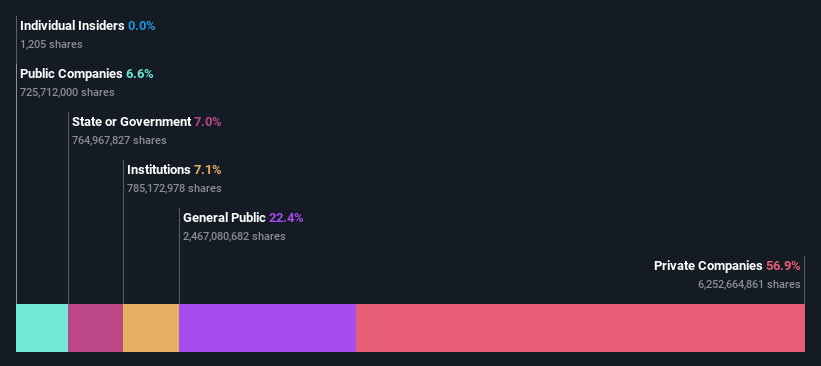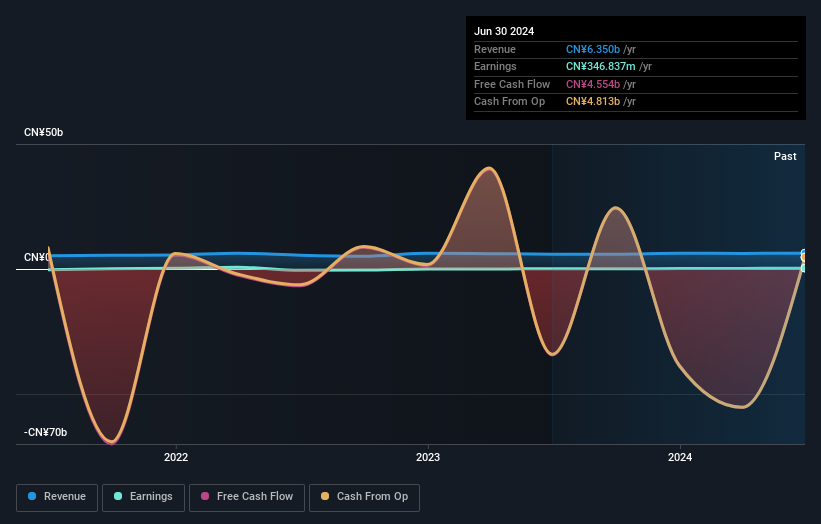Private companies in Harbin Bank Co., Ltd. (HKG:6138) are its biggest bettors, and their bets paid off as stock gained 19% last week

Key Insights
- Significant control over Harbin Bank by private companies implies that the general public has more power to influence management and governance-related decisions
- A total of 3 investors have a majority stake in the company with 55% ownership
- Past performance of a company along with ownership data serve to give a strong idea about prospects for a business
A look at the shareholders of Harbin Bank Co., Ltd. (HKG:6138) can tell us which group is most powerful. We can see that private companies own the lion's share in the company with 57% ownership. That is, the group stands to benefit the most if the stock rises (or lose the most if there is a downturn).
Clearly, private companies benefitted the most after the company's market cap rose by HK$550m last week.
Let's take a closer look to see what the different types of shareholders can tell us about Harbin Bank.
View our latest analysis for Harbin Bank

What Does The Institutional Ownership Tell Us About Harbin Bank?
Many institutions measure their performance against an index that approximates the local market. So they usually pay more attention to companies that are included in major indices.
As you can see, institutional investors have a fair amount of stake in Harbin Bank. This can indicate that the company has a certain degree of credibility in the investment community. However, it is best to be wary of relying on the supposed validation that comes with institutional investors. They too, get it wrong sometimes. When multiple institutions own a stock, there's always a risk that they are in a 'crowded trade'. When such a trade goes wrong, multiple parties may compete to sell stock fast. This risk is higher in a company without a history of growth. You can see Harbin Bank's historic earnings and revenue below, but keep in mind there's always more to the story.

Harbin Bank is not owned by hedge funds. Our data shows that Harbin Municipal People's Government State owned Assets Supervision and Administration Commission is the largest shareholder with 30% of shares outstanding. Heilongjiang Financial Holdings Group Co., Ltd. is the second largest shareholder owning 19% of common stock, and Fubon Financial Holding Co., Ltd. holds about 6.6% of the company stock.
After doing some more digging, we found that the top 3 shareholders collectively control more than half of the company's shares, implying that they have considerable power to influence the company's decisions.
Researching institutional ownership is a good way to gauge and filter a stock's expected performance. The same can be achieved by studying analyst sentiments. Our information suggests that there isn't any analyst coverage of the stock, so it is probably little known.
Insider Ownership Of Harbin Bank
While the precise definition of an insider can be subjective, almost everyone considers board members to be insiders. Company management run the business, but the CEO will answer to the board, even if he or she is a member of it.
Most consider insider ownership a positive because it can indicate the board is well aligned with other shareholders. However, on some occasions too much power is concentrated within this group.
Our most recent data indicates that insiders own less than 1% of Harbin Bank Co., Ltd.. But they may have an indirect interest through a corporate structure that we haven't picked up on. It appears that the board holds about HK$386 worth of stock. This compares to a market capitalization of HK$3.5b. We generally like to see a board more invested. However it might be worth checking if those insiders have been buying.
General Public Ownership
With a 22% ownership, the general public, mostly comprising of individual investors, have some degree of sway over Harbin Bank. While this group can't necessarily call the shots, it can certainly have a real influence on how the company is run.
Private Company Ownership
We can see that Private Companies own 57%, of the shares on issue. Private companies may be related parties. Sometimes insiders have an interest in a public company through a holding in a private company, rather than in their own capacity as an individual. While it's hard to draw any broad stroke conclusions, it is worth noting as an area for further research.
Public Company Ownership
Public companies currently own 6.6% of Harbin Bank stock. We can't be certain but it is quite possible this is a strategic stake. The businesses may be similar, or work together.
Next Steps:
I find it very interesting to look at who exactly owns a company. But to truly gain insight, we need to consider other information, too. Consider risks, for instance. Every company has them, and we've spotted 1 warning sign for Harbin Bank you should know about.
Of course this may not be the best stock to buy. So take a peek at this free free list of interesting companies.
NB: Figures in this article are calculated using data from the last twelve months, which refer to the 12-month period ending on the last date of the month the financial statement is dated. This may not be consistent with full year annual report figures.
Valuation is complex, but we're here to simplify it.
Discover if Harbin Bank might be undervalued or overvalued with our detailed analysis, featuring fair value estimates, potential risks, dividends, insider trades, and its financial condition.
Access Free AnalysisHave feedback on this article? Concerned about the content? Get in touch with us directly. Alternatively, email editorial-team (at) simplywallst.com.
This article by Simply Wall St is general in nature. We provide commentary based on historical data and analyst forecasts only using an unbiased methodology and our articles are not intended to be financial advice. It does not constitute a recommendation to buy or sell any stock, and does not take account of your objectives, or your financial situation. We aim to bring you long-term focused analysis driven by fundamental data. Note that our analysis may not factor in the latest price-sensitive company announcements or qualitative material. Simply Wall St has no position in any stocks mentioned.
About SEHK:6138
Harbin Bank
Provides various banking products and services primarily in China.
Excellent balance sheet with proven track record.


